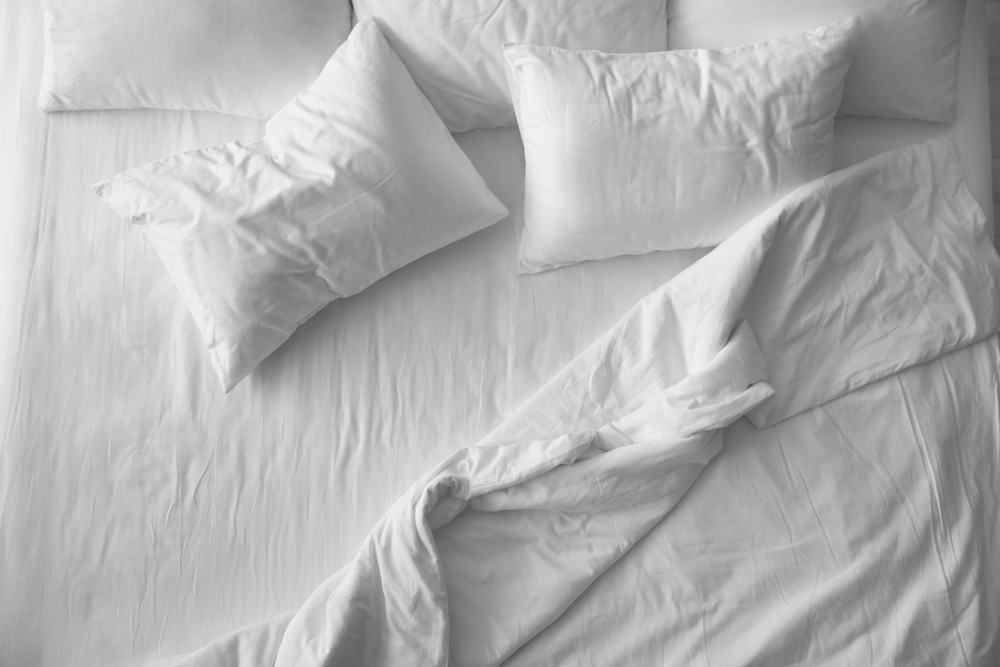While there are no records of sleep deprivation directly killing anyone, it abets many other causes of death. Forcing oneself to stay awake for long periods takes a heavy toll on physical health and sound judgment, even increasing suicide risk.
Not that worrying about the consequences of sleeplessness will help. Anxiety and sleep difficulties feed on each other: the more you worry about insomnia, the less you’ll sleep and the more anxious you will become.
It’s even worse with sleep problems and anxiety disorder, or major depression—or substance use disorder. And while a well-managed rehab and recovery program will eventually lead to better sleep, the struggle may get worse before it gets better.
Sleep Problems During Rehab: Why They Happen
The symptoms accompanying drug detox—frequently likened to a bad case of the flu—aren’t exactly conducive to sound sleep. Nasal congestion and nausea turn relaxation attempts into a battle. Muscle spasms shake you awake. Cravings and panic attacks demand the conscious mind’s attention. Whatever sleep comes is plagued by nightmares. Small wonder that “insomnia” is high on the list of common withdrawal symptoms.
Even after the worst is over, stress-induced sleep difficulties can last throughout the rehab stage. The old routine that included regular drug doses has been upset, and for a time, the brain and body struggle to adjust to a new routine in a new, albeit healthier, environment. The brain is working overtime to make sense of it all while simultaneously being probed by therapy and trying to internalize new ways of thinking and acting.
Sleep Problems After Rehab: Why They Happen
After discharge from inpatient care, the recovering addiction patient once again has to adjust to new routines, usually in an old environment with the extra work of avoiding old temptations. (While relocating to an entirely different environment can produce amazing results—as demonstrated in a famous 1970s study of Vietnam veterans who achieved record low rates of heroin relapse after returning to U. S. civilian life—it’s not an option for most people.)
Managing readjustments takes a toll on brain, body, and the ability to sleep. And counterintuitive as it seems, exhaustion is a frequent contributor to insomnia: when exhaustion is fueled by stress and the brain is kept “productively” busy up to bedtime, the brain finds it particularly difficult to shift from “awake” to “sleep” mode—after all, it’s still set to “full speed ahead” and is fatigued almost beyond the point of processing any new message. And stress-fueled drivenness, the mortal enemy of rest, is still running as well.
On top of everything else, the old nightcap or sleeping pill is no longer an option: one more change for the brain to adjust to, one more temptation to resist. If the “can’t sleep” problem becomes chronic, relapse risk soars.
Fortunately, there’s much you can do to improve your sleep in recovery.
How to Recover Healthy Sleep Patterns.
Don’t Feel Guilty
Simply understanding why you can’t sleep after rehab, and why that’s perfectly normal, goes a long way toward relieving “I should be doing better” guilt. And that in itself takes stress off your mind, making it easier to fall asleep.
Establish a Healthy Bedtime Routine
Habits, including sleep habits, are learned through repetition—preferably repetition of something you enjoy. Make a list of your favorite light snacks, relaxing reading, or aromatherapy formulas; then pick one or two to wind down with each night in the half hour before bed.
Avoid Stimulating Activities
Things best avoided in the last two hours before sleep, due to their stimulating effects on the brain:
- Caffeine in any form
- Work
- Vigorous exercise
- Action-oriented media
- Lit-up electronic screens, even if used for quiet reading and music
Manage Your Bedroom Environment
The darker, quieter, and cooler your bedroom, the better you’ll sleep. If you have problems with outside lights and sounds, find something to block them out (thick window shades, earplugs, white noise).
Make sure your mattress and bedding are comfortable—nothing that scratches or is too hard, too soft, too heavy, or too lightweight. And try not to read or work in bed at any hour: the more your brain associates the bedroom with sleep and only sleep, the better.
Set Your Brain for Sleep
Meditating, or visualizing yourself in a pleasant scene, works even better than counting sheep.
Get Help
If you still can’t sleep, talk to a caring friend or therapist. Outside perspective and support are often all the permission your mind needs to reestablish proper sleep patterns.
Expect Better Days
Finally, remember that post-rehab insomnia is only temporary. Eventually, your brain will adjust and you’ll be enjoying a full night’s sleep every night, dreaming of even healthier days to come!
Hospital-Based Addiction Treatment
Taking care of your physical and mental health can make all the difference in addiction recovery. As part of the Hemet Valley Medical Campus (Hemet, CA), Hemet Valley Recovery Center is a great treatment-provider choice if you suffer from insomnia or other health issues along with addiction. For more information about our programs, please contact our admissions team.


